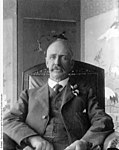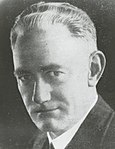Martindale Hall
| Martindale Hall | |
|---|---|
 | |
 | |
| General information | |
| Architectural style | Georgian |
| Town or city | Near Mintaro, South Australia |
| Country | Australia |
| Coordinates | 33°56′16″S 138°43′46″E / 33.9378°S 138.7294°E |
| Construction started | 1877[1] |
| Completed | 1880 [2] |
| Cost | £30,000 [2] |
| Client | Edmond Bowman |
| Design and construction | |
| Architect(s) | Ebenezer Gregg |
| Engineer | Edward John Woods |
Martindale Hall is a Georgian style mansion near Mintaro, South Australia which appeared in the film Picnic at Hanging Rock.[3]
Construction
Martindale Hall was built for a wealthy bachelor pastoralist, Edmund Bowman Jr[4] (1855–1921). The architect was Ebenezer Gregg of London, the chief supervisor was Adelaide architect Edward John Woods and the builder was R. Huckson, who completed the work in 1880.[5] Due to the specialist nature of the work involved, 50 of the 60 tradesmen were brought from England, and they returned when it was completed.[1][6] The hall has 32 rooms and also a large seven-room cellar, and its environs at the time also included a polo ground, a racecourse, a boating lake and a cricket pitch.[2]
History
A decade after its construction, debt and drought forced the Bowmans to sell all their holdings.[3] William Tennant Mortlock (son of William Ranson Mortlock) bought Martindale Hall in 1891. His son, John Andrew Tennant Mortlock, developed Martindale Station and built up an impressive collection of artwork which was displayed at the Hall.[1] In his will Mortlock bequeathed 400 acres of farmland and the Hall to the University of Adelaide and the Libraries Board of South Australia, while providing a life interest in the estate to his widow Dorothy Mortlock.[7] Dying childless, his wife became the heir to the Mortlock fortune, and she bequeathed Martindale Hall and the estate to the University of Adelaide in 1979 upon her death.[8]
On 21 March 1978, it was listed on the now-defunct Register of the National Estate[9] On 24 July 1980, it was listed as a state heritage place on the South Australian Heritage Register.[10]
Martindale Hall along with 19 hectares (47 acres) of grounds were later handed to the South Australian Government by the university in 1986. On 5 December 1991, the land on which the building is located was proclaimed as the Martindale Hall Conservation Park under the National Parks and Wildlife Act 1972 for "the purpose of conserving the historic features of the land".[11] From 1991 to late 2014, the property was managed under lease as a tourism enterprise, offering heritage accommodation, weddings and other functions, and access to the grounds and Hall to day visitors. The property is currently managed by the Department for Environment and Water, which in August 2015 received an unsolicited bid for the purchase or long-term lease of Martindale Hall.[12][13] by the National Trust of South Australia.
Fight to Save
The public of South Australia are determined to keep the Hall open to the public. Opposition to the push to privatize the Hall began in the 1970s when Adelaide University started selling off the surrounding area. A crowd of 5,000 people attended the Hall in the 1970s to protest the university's action.
In May 2016 the National Trust of South Australia launched[14] a surprise bid to operate historic Martindale Hall under a plan it said should transform the 136-year-old estate into a major tourist destination and keep the building in public hands. The proposal would see a new National Art Exhibition space, and a re-created Pleasure Garden.
However, on Wednesday 9 June 2021, the S.A. House of Assembly passed a so-called "Martindale Hall (Protection and Management) Bill 2021" under which the appropriate Minister may grant "An access agreement entered into under this section in respect of a lease attaches to the land and is binding on every other person who holds a lease or licence in relation to Martindale Hall."[15] This allows the Minister to grant restricted use of the Hall subject to a Lease he or she has granted.
Usage
The Hall and grounds are currently open to the public, six days a week (closed Tuesdays), as a day visitor site and museum.
Gallery
- Edmund Bowman Jr in 1914.
- William Tennant Mortlock in 1901.
- John Mortlock in 1936.
- Martindale Hall in 1932.
Notes
References
- ^ a b c "Martindale Hall Revisited: Clare Valley". Postcards. Archived from the original on 23 June 2005. Retrieved 20 January 2009.
- ^ a b c Martindale Hall, martindalehall-mintaro.com.au. Retrieved 2017-08-28
- ^ a b "Martindale Hall website". martindalehall.com. Archived from the original on 27 March 2009. Retrieved 20 January 2009.
- ^ "On this day. 14 August 1866 Edmund Bowman". sahistorians.org.au. Retrieved 23 March 2023.
- ^ "Mr. E. Bowman's Mansion at Martindale". South Australian Register. Adelaide. 16 December 1880. p. 6. Retrieved 19 October 2012 – via National Library of Australia.
- ^ "Martindale Hall". South Australian History. Retrieved 20 January 2009.
- ^ Peacock, Darren. "Magnificent heritage icon Martindale Hall at risk" (PDF). history.org.au. The Federation of Australian Historical Societies. Retrieved 17 November 2024.
- ^ Benefactors and donated collections: Mortlock, State Library of South Australia. Retrieved 2017-08-28
- ^ "Martindale Hall, Mintaro, SA, Australia (Place ID 7157)". Australian Heritage Database. Australian Government.
- ^ ""Martindale Hall", Martindale Hall Conservation Park". South Australian Heritage Register. Government of South Australia. 24 July 1980. Retrieved 14 January 2018.
- ^ "NATIONAL PARKS AND WILDLIFE ACT 1972 SECTION 30(1): CONSTITUTION OF MARTINDALE HALL CONSERVATION PARK" (PDF). South Australian Government Gazette. Government of South Australia. 5 December 1991. p. 1668. Retrieved 14 January 2018.
- ^ Health retreat proposal for historic Martindale Hall Archived 6 August 2015 at the Wayback Machine InDaily, 5 August 2015. Accessed 12 August 2015.
- ^ Martindale Hall Unsolicited Proposal Archived 28 August 2017 at the Wayback Machine National Parks SA, 5 August 2015. Accessed 12 August 2015.
- ^ Martindale brawl: Fight for hall’s future (subscription required)
- ^ "Martindale Hall (Protection and Management) Bill 2021. Part 5—Public access to land - Section 17" (PDF).[dead link]




